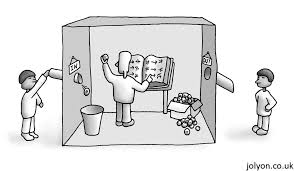Filosofia

- Oscilações Entre O Reducionismo E O Fisicalismo Não-redutivo No Naturalismo Biológico De John Searle
RESUMO: O artigo examina a concepção de Searle sobre a redução da consciência (em especial a sua teoria acerca de seus poderes causais), que se mostra obscura e incoerente. Porém, essa incoerência não é inevitável, pois o naturalismo biológico...
- Aic 2013 - International Workshop On Artificial Intelligence And Cognition
Turin, Italy, December 3rd, 2013 Workshop website: http://di.unito.it/aic2013 Submission deadline: September 21st, 2013 Workshop of AI*IA 2013, 25th Year Anniversary, Turin, Italy XIII Conference of the Italian Association for Artificial Intelligence...
- If A, Then B: How The World Discovered Logic
Columbia University Press, June, 2013MICHAEL SHENEFELT and HEIDI WHITE Examining a variety of mysteries, such as why so many branches of logic (syllogistic, Stoic, inductive, and symbolic) have arisen only in particular places and periods, If...
- Religiões...
Num cemitério da cidade de São Paulo, ocorre a seguinte cena: Um brasileiro carregando um vaso de flores brancas vê um chinês carregando um prato de porcelana cheio de arroz... O brasileiro se choca com a cena, não resiste à si mesmo e pergunta...
- And There Is (not) A Whole Lot Left To Say Now...
Querida Sofia, Tu bem que sabes o quanto eu gosto de musica. Por vezes achamos que mais nada nos poderá emocionar, fazer-nos sentir o tal de "essa música foi feita para mim". Estava - de novo - enganada. Esta música corresponde-me perfeitamente.Minto.Esta...
Filosofia
O Experimento de Pensamento do Quarto Chinês: a Crítica de John Searle à Inteligência Artificial Forte
RESUMO:
Será que um dia serão desenvolvidos computadores digitais capazes de pensar de modo similar ao nosso? Ou será que, independentemente da tecnologia, os computadores digitais estarão sempre limitados a manipularem dados sem compreendê-los? Neste trabalho, apresentarei duas concepções antagônicas de Filosofia da Mente: a Inteligência Artificial Forte (IA Forte), que responde afirmativamente à primeira questão, e a crítica de John Searle a esta corrente, que, por sua vez, responde de maneira afirmativa à segunda questão. Para tanto, iniciarei o artigo apresentando o famoso jogoda imitação proposto por Alan Turing (1950) para decidir se uma máquina é ou não inteligente, jogo este que ficou conhecido como teste de Turing. Logo em seguida, analisarei minuciosamente o experimento mental do quarto chinês (proposto em 1980 por John Searle), que é uma crítica ao teste de Turing e ao programa de pesquisa da Inteligência Artificial Forte (IA Forte).
Palavras-chave: Teste de Turing; Inteligência artificial; Quarto chinês; John Searle.
Autor: Maxwell Morais de LIMA FILHO
Artigo publicado originalmente em Argumentos - Revista de Filosofia, ano 2, nº 3 - 2010/ Universidade Federal do Ceará
Disponível em: http://www.filosofia.ufc.br/argumentos/pdfs/edicao_3/06.pdf
ABSTRACT:
Will one day developed digital computers be able to think in a similar way we human beings do? Or, being independent of technology, will they always be limited to manipulate data without comprehend them? In this work, I will present two opposite conceptions of Philosophy of Mind: the Strong Artificial Intelligence, which responds positively to the first question, as well as John Searle’s critique to this line, which responds positively to the second question. Therefore I will begin the article presenting
the famous imitation game proposed by Alan Turing (1950) in order to decide if a machine is intelligent or not. This game is known by Turing’s test. Then I will exhaustively analyze the mental experiment of the chinese room, proposed by John Searle in 1980, which is a strong critique to the Turing’s Test and to the research program of the Strong Artificial Intelligence.
Key words: Turing’s test; Strong artificial intelligence; Chinese room; John Searle.
loading...
- Oscilações Entre O Reducionismo E O Fisicalismo Não-redutivo No Naturalismo Biológico De John Searle
RESUMO: O artigo examina a concepção de Searle sobre a redução da consciência (em especial a sua teoria acerca de seus poderes causais), que se mostra obscura e incoerente. Porém, essa incoerência não é inevitável, pois o naturalismo biológico...
- Aic 2013 - International Workshop On Artificial Intelligence And Cognition
Turin, Italy, December 3rd, 2013 Workshop website: http://di.unito.it/aic2013 Submission deadline: September 21st, 2013 Workshop of AI*IA 2013, 25th Year Anniversary, Turin, Italy XIII Conference of the Italian Association for Artificial Intelligence...
- If A, Then B: How The World Discovered Logic
Columbia University Press, June, 2013MICHAEL SHENEFELT and HEIDI WHITE Examining a variety of mysteries, such as why so many branches of logic (syllogistic, Stoic, inductive, and symbolic) have arisen only in particular places and periods, If...
- Religiões...
Num cemitério da cidade de São Paulo, ocorre a seguinte cena: Um brasileiro carregando um vaso de flores brancas vê um chinês carregando um prato de porcelana cheio de arroz... O brasileiro se choca com a cena, não resiste à si mesmo e pergunta...
- And There Is (not) A Whole Lot Left To Say Now...
Querida Sofia, Tu bem que sabes o quanto eu gosto de musica. Por vezes achamos que mais nada nos poderá emocionar, fazer-nos sentir o tal de "essa música foi feita para mim". Estava - de novo - enganada. Esta música corresponde-me perfeitamente.Minto.Esta...
